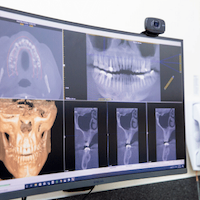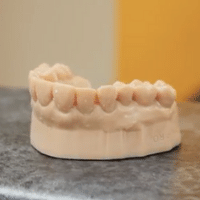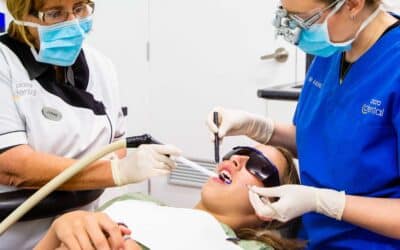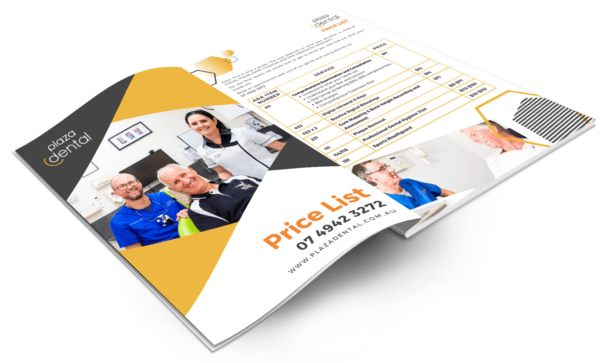Replacing Missing Teeth – Dental Implants
Dental Implants are the closest thing we have to replacing a tooth with a new tooth, but they are not a new tooth. Dental Implants have many advantages to other options when replacing missing teeth, but they do have some limitations. In this blog I try and cover some of FAQ’s regarding Dental Implants.
What can Dental Implants be used for?


- To replace a single missing Tooth. Dental Implants are the strongest, most durable way to replace a single missing tooth.
- To replace a group of missing teeth. Two or more Dental Implants can be joined together to replace everything from two teeth to all the teeth in a jaw.
- To provide additional stability for partial or full dentures.
How do Dental Implants Work?
Dental Implants are made from Titanium and are inserted into the jaw bone during a surgical procedure. These Dental implants ‘osseointegrate’ over time. This means that the bone heals against the implant and for all intents and purposes sticks to the implant and holds it in place. Once it has healed the implant provides a stable anchor in the bone.
This can then be used to support any of the restorations described above. It is not like screwing a Dynabolt into a concrete wall, because bone is living tissue, so while the procedure has a high success rate, the implant does need maintenance and there can occasionally be problems. We will look at this later.
Can Implants be Placed at the Dentist or do I need to go to Hospital?
Over 90% of implants we place are done under local anaesthetic in the dental chair. Occasionally people elect to have the implants placed under a General Anaesthetic in hospital. This can be because of the difficulty of their particular case, the fact that they are very nervous about the procedure, or occasionally because they have other health concerns which makes it safer for the procedure to be done in a hospital setting.

Generally however the implants are placed under local anaesthetic in the dental chair while you are awake. Because of the local anaesthetic there is minimal discomfort during the procedure and people usually find that it is comparable to other dental procedures.
How Much Pain will I Be in?
As I described earlier, there is minimal discomfort during the procedure due to the local anaesthetic, but there will be some discomfort and swelling following the Implant placement. This is usually managed with ice packs, anti-inflammatories such as Ibuprofen(eg Nurofen), and Paracetamol(eg Panadol). Only occasionally are stronger pain killers needed. Many people are able to stop pain relief within 2 days of the implant placement.
What are the Steps involved in getting a Dental Implant?
The steps vary somewhat depending on each persons situation, and sometimes one, two or more steps can be combined into a single appointment, but this gives a rough outline.
- Diagnosis and Planning for Dental Implant placement and restoration
- Removal of a tooth or teeth that are being replaced by Dental Implants
- Placement of the Dental Implant
- Making of the final restoration/s which will replace the missing teeth (Crowns, Bridges or Dentures)
As I said this varies from person and you will be given an accurate idea of your personal situation during the first stage where we obtain all the information to plan for your situation and then give you a plan which is designed to address your concerns.
How long does it take to get a Dental Implant?
 The time varies from person. Because the implant is placed into living tissue (bone and gum) we need to wait for things to heal. Sometimes a tooth can be removed, and implant placed and a temporary crown put over the top. That is not the final crown and there is still work to do.
The time varies from person. Because the implant is placed into living tissue (bone and gum) we need to wait for things to heal. Sometimes a tooth can be removed, and implant placed and a temporary crown put over the top. That is not the final crown and there is still work to do.
Often there is a waiting period between when the tooth is removed and the implant placed to allow for bone formation, and a second wait while the implant osseointegrates (bonds) to the bone.
This means that usually it takes between about 4 and 7 months from start to finish but complex cases can take over a year.
What can go wrong?
Dental Implants are a very predictable treatment option with long term survival rates generally reported over 95%. However because we are dealing with biologic tissues there are potential problems. These include
- Failure of the implant to integrate. This means that instead of the bone healing up to the implant and holding it in place a fibrous capsule forms around it which is too weak to support a crown or denture. This is reported to happen in less than 2% of cases.
- Damage to surrounding structures including nerves and sinuses. This can be almost completely eliminated by careful planning including obtaining 3D scans similar to CT-Scans.
- Loss of bone around the Implant. In most cases, as long as the area around the implant is kept clean the tissues around it like the gum and bone remain healthy, but good oral hygiene is still essential to care for your implant.
- Post-Operative Infection. Implant placemnt is a surgical procedure, so there is always a risk of infection following the procedure. We do all we can to minimize this risk.
- Other miscellaneous risks such as chipping or breakage of restorations, or loosening of the screw which holds them in place. These problems happen quite rarely and can usually be dealt with efficiently by our practice.
What Now?
I understand that all this information is general and it is difficult to work out what applies to you. At our practice Dr Steve Pearson places Dental Impants while Dr Martin Cahill restores the Dental Implants and co-ordinates the process.
So if you wish to obtain more information about your suitability for Dental Implants then booking an consultation with Dr Cahill is the best place to start. He will be able to assess your general suitability for Dental Implants, give you a general idea of how simple or complicated the process would be and a rough idea on costs.
From there more detailed planning can occur, Dr Pearson will place the Dental Implants, and Dr Cahill will finalise things with the Restorations (Crowns, Bridges or Dentures)
If you wish to book an appointment please phone on 07 4942 3272 or use the online booking tool below.
The content has been made available for informational and educational purposes only. Plaza Dental does not make any representation or warranties with respect to the accuracy, applicability, fitness, or completeness of the content.
The content is not intended to be a substitute for professional personal diagnosis or treatment. Always seek the advice of your dentist or another qualified health provider with any questions you may have regarding a dental or medical condition. Never disregard professional advice or delay seeking it because of something you have read or seen on the Site.
Services we mentioned:
Related Articles
Dental Implant Hearing Aids
It’s a study published in the Journal of the Acoustical Society of America rather than the Journal of the American...
Can Having Bad Oral Health Affect An Entire Country?
Can Having Bad Oral Health Affect An Entire Country? If it does, it sure makes ignoring and neglecting our oral health...









